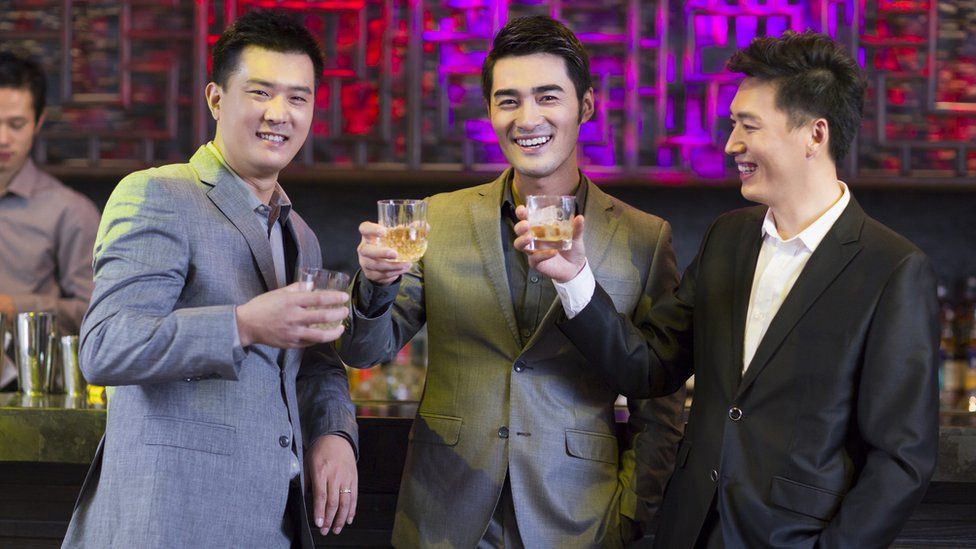ARTICLE AD BOX
 Image source, Getty Images
Image source, Getty Images
By Katie Silver
Business reporter
The Lunar New Year is traditionally a time for gathering with family and friends to eat and drink.
And for hundreds of years the drink of choice in China for these celebrations has been baijiu - a clear spirit made with fermented grains which packs a potent punch.
Baijiu is also often drunk straight and at social events such as weddings and birthdays.
Its Alcohol-By-Volume (ABV) can top 60% - in comparison spirits like scotch whisky and tequila typically have an ABV of around 40%.
"Baijiu certainly still has its place in Chinese liquor consumption, even among young consumers," says Allison Malmsten, public research director at Daxue Consulting.
It accounts for well over 90% of China's spirits sales, with annual sales of around $160bn (£127bn).
However, in recent times drinks from abroad have been growing in popularity in what is the world's biggest spirits market.
Brand new story
In 2022, sales of whisky in China were valued at $2.3bn, according to market research firm Euromonitor International.
That figure is expected to almost triple by 2027 as the whisky market there is expected to grow at around five times the rate seen globally.
Those sales are being driven by young, middle class, urban, educated and increasingly female drinkers.
Many of them are shunning baijiu in favour of less alcoholic spirits from outside China, according to Ms Malmsten.
The growth in demand for whisky in particular, has helped encourage international brands to open distilleries across China.
Image source, Getty Images
Image caption,Pernod Ricard launched its Chuan Pure malt whisky in December
Amongst them is French drinks giant Pernod-Ricard, which owns the Jameson Irish whiskey brand as well as Beefeater Gin and Absolut Vodka. It is investing $140m in a production base near Emei Mountain in Sichuan Province, Southwest China.
UK-based rival Diageo also opened a plant in the Yunnan Province in December and is currently trialling production with plans to be fully up and running later this year. The company is also opening an Asia-Pacific Innovation hub in Shanghai.
"We are here for a long-term play," Managing Director for Diageo in China Atul Chhaparwal told the BBC.
He is bullish about the market, saying the demand is so strong that is space for everyone.
"Given the vibrancy of the overall whiskey category in China, there will be enough space for single malts, for blended whiskies, for local players, for imported whiskey, to grow," he says.
"Whiskey currently makes up less than 2% of the total spirits consumed in China, which indicates that how much room headroom everyone has to play in here," he adds.
That includes homegrown distilleries which have sprung up across the country. Pernod estimates there are between 30 and 50, with many still being built.
The whisky market is also expanding in other parts of Asia.
"The growth is immense", spirits retailer Maison du Whisky's Jamie Li told the BBC in the French company's store in Singapore.
In 2022, sales of whisky in China were valued at $2.3bn
Mr Li, who heads sales to South Korea, Japan and China expects to see a boost during the Lunar New Year as Chinese tourists visit Singapore.
"Chinese New Year is kind of like Christmas in Europe - it's festive, people want to spend money, buy nice gifts and have something memorable. So whisky is part of their memory," he says.
There is also a growing number of collectors who "buy and hold" bottles of whisky which are expected to rise in value.
But it's not all smooth sailing for China's whisky market warns Ms Malmsten.
"The local distilleries are still in the early stages. 80% of the whisky has only been aged for two years or less. There's a lack of barrels and a lack of professionals to help with production," she says.
Still, if the success of China's wine industry is anything to go by, 'watch this space' when it comes to whisky.
"What we saw with China's wine industry is that once it started to mature, the demand for Chinese wines skyrocketed. In our recent survey, we found that after French wines, Chinese wines are the second most preferred," Ms Malmsten says.
"As China's whisky production matures, we might see a similar rise in demand for domestically produced whisky as well."

 11 months ago
14
11 months ago
14








 English (US) ·
English (US) ·